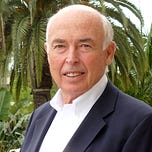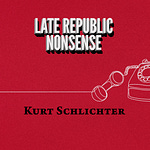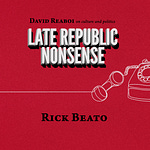Angelo Codevilla passed away on Tuesday evening in a tragic traffic accident near his home in California. He was 78.
Like so many others, I was one of Angelo’s students—first from afar, as a regular reader of his work in CRB, The American Mind, American Greatness and elsewhere, eagerly anticipating his latest piece. He had been such an influence on my thinking—especially about foreign policy and war—and then, over the last five years, became the most essential political polemicist of the American Right.
More than that, though, I’m lucky to have known personally him through the indispensable Claremont Institute. His knowledge, wisdom and erudition was only matched by his fearlessness. Angelo didn’t give a damn; he would tell you exactly what he thought, and you could take it or leave it. That said, forthrightness and all, he was usually smiling, quick to laugh—and exceedingly kind and generous with his time, attention, and compliments.
Not too long ago, when I began this occasional Late Republic Nonsense podcast, the obvious first guest was Angelo. Unfortunately, I couldn’t get the tech side happening; instead, we just had a conversation at length about his most recent piece for The American Mind, “To Rescue a Nation.” That piece, I think, ends up being Angelo’s final masterwork. I’m gratified that I got the chance to thank him, once again, for being such an important part of my intellectual life for nearly two decades.
Rest in Peace. Baruch dayan ha'emet.




I was introduced both to Claremont and to Angelo at the same moment. I was living in New York and playing jazz. One afternoon, I leafed through a copy of CRB in early 2002 at the Tower Records video and magazine annex on Lafayette and E4th Street.
I opened the tabloid-sized magazine and was riveted. Here was Angelo Codevilla presenting a critique of the then-nascent War on Terror from a perspective that seemed entirely sensible and prudent. It was miles away from the naive and radical Acela corridor neoconservatism you’d find in the Weekly Standard or on Fox News; it was just as far from isolationism or what was then known as “blame America first.” I didn’t know it at the time, but Angelo’s prescriptions and perspective was essentially Jacksonian.
At the time, I wondered why Angelo’s voice never made it to talk radio or into the pages of the New York Post. Years later, I came to understand that what many of these legacy conservative institutions do best is “gatekeeping”—better to non-person your critic than to have to go down the rabbit hole of debating his ideas. Create the impression that there’s no debate at all. After all, if you engage, you might well lose. Besides, considering the national mood following 9/11, the Bush White House could (gladly) withstand criticism from isolationists; if it ignored Angelo’s (and Claremont’s) perspective entirely, it would keep the Republican Party unified.
Of course, this was a major tragedy with far-reaching consequences—including for our politics today.
If you haven’t yet read Angelo’s 2010 classic, The Ruling Class, it’s clear you haven’t really understood the currents in American politics over the last decade. That essay alone is enough to solidify his reputation as one of American politics’ most incisive and forward thinking commentators. His other longer works— including The Covid Coup; The Cold Civil War; Our Revolution’s Logic; After the Republic; The Lost Decade; and To Rescue a Nation—are no less fascinating and essential.
His books on international affairs are must-reading for everyone seriously grappling with these issues. They include Informing Statecraft: Intelligence for a New Century, The Character of Nations, War: Ends and Means and especially To Make and Keep Peace Among Ourselves and with All Nations—a book that changed the way I understand so many issues, both foreign and domestic. My copy is never far from my desk.
Most of the morning on Tuesday, many of us in the Claremont family traded texts and phone calls. I wanted to pull together a few friends to talk about Angelo’s work—and, with about 15 minutes notice, we got my very good friends Michael Anton, Ryan Williams, and Kyle Shideler. I’m gratified that more than 40,000 people (so far) have watched the livestream.
On the Turntable
I’ve loved this record for more than 20 years. It’s a live date in Los Angeles, with the New York alto saxophonist Lee Konitz sitting in withe the quintessential West Coast group in jazz—in fact, the group that defined the entire sound.
Here Lee is the primary soloist, and uses Mulligan’s band—comprised of legends Chet Baker, Larry Bunker, Carson Smith, as well as the leader himself—as a very sympathetic backdrop. The wonderful and creative interplay for which this band was known is in evidence on many of these tunes, but Lee’s playing here stands with some of the all-time greatest improvisations in the history of jazz.
Blue Note’s Tone Poet Series of vinyl reissues just released “Lee Konitz Plays With The Gerry Mulligan Quartet” on 180 gram vinyl. The sound is magical—you feel like you’re in the room with the band. Listening to this new pressing is a revelatory experience.













